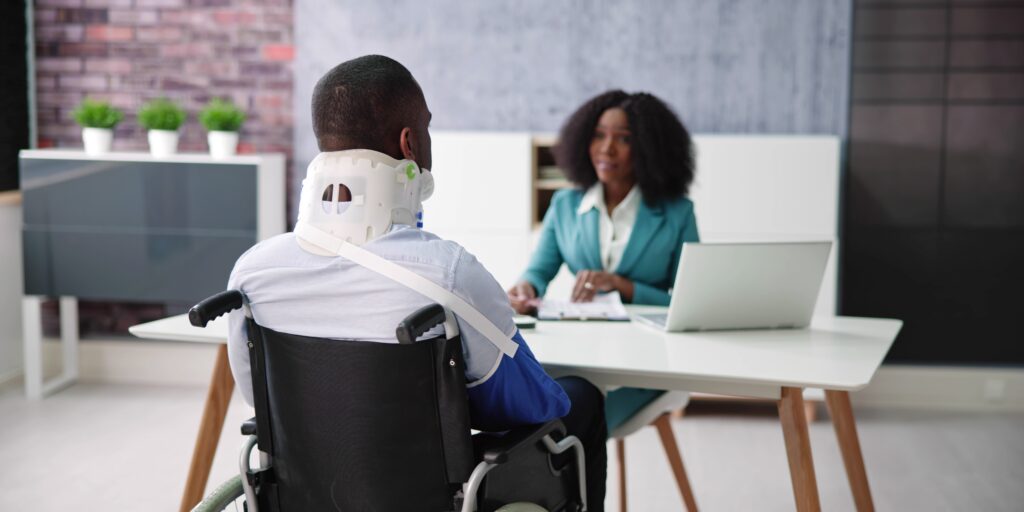FAQs
Personal Injury-general

Hiring a personal injury lawyer can be crucial for several reasons:
- Legal Expertise: Personal injury law is complex and constantly evolving. A skilled lawyer has the expertise and knowledge to navigate the legal system, ensuring that you understand your rights and options.
- Maximizing Compensation: An experienced lawyer can help you secure the maximum compensation you deserve. They can assess the full extent of your damages, including medical expenses, lost wages, pain and suffering, and more.
- Investigation: Lawyers have the resources to conduct a thorough investigation, gather evidence, and interview witnesses, which is essential for building a strong case.
- Negotiation Skills: Personal injury lawyers are skilled negotiators who can engage with insurance companies and other parties on your behalf to reach a fair settlement. They’ll work to protect your interests and prevent lowball offers.
- Trial Experience: In the event your case goes to trial, a personal injury lawyer is essential. They can represent you in court, presenting a compelling case and advocating for your rights before a judge and jury.
- Reducing Stress: Dealing with the aftermath of an accident or injury can be emotionally and physically taxing. A lawyer can handle the legal aspects, allowing you to focus on your recovery.
- Contingency Fees: Many personal injury lawyers work on a contingency fee basis, meaning you only pay them if they win your case. This eliminates the financial burden of hourly legal fees.
- Access to Resources: Lawyers often have access to medical experts, investigators, and other professionals who can support your case and strengthen your claim.
- Time Savings: Legal proceedings can be time-consuming. A lawyer can streamline the process, helping you resolve your case more efficiently.
- Peace of Mind: Knowing that a qualified lawyer is working on your behalf can provide peace of mind and confidence in pursuing the compensation you deserve.
In summary, hiring a personal injury lawyer can significantly improve your chances of a successful outcome, protect your rights, and help you receive fair compensation for your injuries. It is a crucial step to ensure you get the support you need during a challenging time.
AAPC Lawyers provide a free consultation for any personal injury issues. For other matters please contact our office for information on consultation fees.
If you are directly or indirectly involved in an accident that causes property damage, bodily injury, or death, you have certain legal obligations. There are also steps you should take to protect yourself legally if the accident injures someone or causes property damage:
- Stay at the scene!
- you must remain at or immediately return to the scene of the accident
- it is illegal to leave the scene of an accident whether you were directly or only indirectly involved in the accident
- the penalties for failing to remain at the scene include a fine of between $200 and $2,000, seven demerit points, up to six months in jail and suspended license for up to two years
- Care for the injured
- call an ambulance if it appears that someone is injured
- do not touch the injured person unless you have medical training or unless the victim’s needs are clear
- Call the police
- you are legally obliged to call the police when someone is injured or there is significant property damage
- Note the precise time and date and details of the accident
- The license plate of the other car
- It’s make, model and year
- The other driver’s address and telephone number
- If others were involved in the accident, get their names, addresses and telephone numbers as well
- The name of the other driver’s insurance company and policy number
- The names and phone numbers of witnesses to the accident
- Keep a record of injuries suffered and medical attention required for as long as the symptoms remain
Please note that upon request you must provide to all witnesses:
- Name,
- Address,
- Telephone number,
- Vehicle permit number and
- Insurance information
Be careful about what you say. Do not admit anything. Do not offer to pay for anything or accept any payments from anyone. Contact a lawyer or an insurance agent before you accept a payment or sign a release.
Keep a record of your medical or mechanical expenses, damaged property and injuries. Take the time to do your own research and consider the qualifications of several potential legal representatives.
- Contact AAPC lawyers at 905-874-7011
- Contact your insurance company within 7 days
- File your completed Accident Benefit application within 30 days (AAPC can fill out all the forms for you)
- Report your injuries to your employer or school
- Record the names of all attending healthcare professionals
- Keep all receipts for related expenses including those incurred by family members helping the injured person
- Keep a record of all your health problems
- Photograph your injuries
- Check for health and injury coverage provided through your employer, health and benefit carrier, credit card company, or any other source
Make sure that there is no information about the accident or your health on online social networks (e.g., Facebook, Twitter). Insurance companies have the right to access your online social networks and draw conclusions, which may make them unwilling to settle your case early and for a large sum.
You may want to fight a traffic ticket because the consequences of being convicted can be serious. The penalties for traffic offenses can include fines, demerit points, license suspension, and imprisonment. If you are convicted of a traffic offense, your insurance premiums will also likely increase.
It may be worthwhile to hire a paralegal and fight a ticket simply to protect your driving record and avoid or minimize the penalties of a traffic offense. If you fight a traffic ticket, you might be able to reduce the fine, get more time to pay it, have the ticket dismissed, or plead guilty to a less serious offense.
Please refrain from posting anything related to your accident on social media such as Facebook, Instagram, or Twitter. Do not remove or alter anything already on your social media but keep them preserved. Details of your accident posted on social media can be used against your case by your insurer.
Accident Benefits

If you are injured in a traffic accident, your automotive insurance will pay a certain amount based on the nature and severity of your injuries and the expenses you have incurred and will incur in the future. The availability of these benefits is limited by the Statutory Accident Benefits Schedule. If your insurance is unwilling to pay for some or all your benefits, you have the option to contest your insurer’s decision. An AAPC lawyer can help you apply for these benefits and represent you if your insurer denies your benefits.
AAPC will complete and submit your OCF (accident benefit) forms to your insurance company. You are eligible for these benefits based on the injuries you sustained in the accident and their impact on your quality of life. It doesn’t matter whether you were at fault for the collision.
Depending on your situation, you may be entitled to:
- Medical and rehabilitation benefits;
- Caregiver benefits;
- Housekeeping and Home maintenance benefits;
- Attendant Care benefits;
- Income Replacement benefits;
- Non-earner benefits;
- Loss of education expenses;
- Expenses for visitors;
- Travel expenses;
- Damage to clothing, glasses, hearing aids, etc.;
- Death and funeral benefits;
- Optional Dependent benefits.
Your accident benefits may have been stopped due to various reasons, such as changes in your eligibility status, failure to provide required documentation, or reaching the maximum benefit period. It’s crucial to determine the specific cause of your accident benefits being discontinued.
If your accident benefits were stopped, and you believe you are still eligible, you can follow these steps to reapply and potentially resolve the issue:
- Contact Your Insurance Company: The first step is to reach out to your insurance company or provider. Discuss the situation with them, express your concerns, and inquire about the reason for the benefit stoppage. Ensure that you have all the necessary documentation and information at hand.
- Provide Required Documentation: If your insurance company requests any additional information or documentation to support your claim, provide it promptly. This may include medical records, accident reports, or other relevant evidence.
- Work with Legal Counsel: If your insurance company continues to deny your benefits and you believe you have a valid claim, consider seeking legal advice and assistance. AAPC Lawyers can help you navigate the process and represent your interests in your dispute.
- Submissions/Applications to the Licence Appeal Tribunal: If your insurance company persists in denying your accident benefits, AAPC Lawyers can submit an application to the Licence Appeal Tribunal (LAT) for a dispute. The LAT is an independent body in Ontario that handles various types of appeals related to automobile accident benefits.
- What are the typical fees for initiating LAT appeal?The typical fees for initiating an LAT appeal may include an application fee, which can vary. As of the latest update in 2022, the application fee was One Hundred and Six dollars ($106.00). However, it’s important to check the latest fee schedule on the Licence Appeal Tribunal’s official website or consult with our team of legal professionals for the most up-to-date information.
Tort Claims

A tort claim is a civil claim asking for compensation from a person who has injured you physically or otherwise. At AAPC we generally deal with tort claims that arise from injuries sustained in a motor vehicle accident where the other party was at fault.
Inform AAPC of the details of the accident. Bring any evidence that may be helpful to your claim. Preserve your records. AAPC will determine who is likely to be at fault in the accident. Unlike accident benefits, which depend only on your injuries, you must not be at fault to pursue a tort action.
- Any photos of the vehicle damage or your personal injuries after the accident
- Motor vehicle accident report or self-reporting centre collision report
- Any documentation describing how the accident happened
- Your health card
- Your income tax returns and assessments for the past 5 years
- Complete employment file from your employer at the time of the accident
- Pay stubs from your employer at the time of the accident
- Any previous accident benefit or property damage file from your insurance company
- Clinical notes and records from your family doctor and any other physician you saw
- Clinical notes and records from any rehabilitation or other clinics you attended or are attending
- Your OHIP history
- Your prescription medication history
- Any ambulance or emergency records
- Any other record of expenses you or your family members incurred due to the accident
- Preserve all of your social media accounts but do not post anything new post-accident without first consulting AAPC
- If you are not at fault, AAPC will issue a Statement of Claim against the other driver, initiating court proceedings.
- The other driver’s insurance company will stand in for them and issue a Statement of Defense.
- Both sides will exchange information and evidence, and discuss settlement. As part of this process, you may be required to attend an Examination for Discovery, in which you must answer questions related to the accident.
- If no settlement is reached, mediation or arbitration may be necessary.
- If the claim is still unresolved after mediation or arbitration, it will go to trial, after which the amount of damages will be determined by a judge.
AAPC takes your case on a contingency fee basis, recovering a percentage of your settlement or trial damages. We charge no fees upfront meaning you will not have to pay out of pocket for any legal services rendered until your matter is completed. If you receive nothing, we absorb the cost.
The amount of time it takes to resolve a case depends on the parties involved and the complexity of the issues in dispute. Generally, it will take several months or years.
Court services are available in English and French. French language services are provided at the request of the applicant. Interpretation services in other languages must be arranged by the party requiring them at the party’s own expense. AAPC arranges interpreter services for its clients at minimal cost to them.
Give us a call at (905) 874-7011! Our friendly staff is always happy to answer your questions.
Family Law

Getting Married
You can have a Marriage Contract or Cohabitation Agreement. These marriage safeguards cover various property, assets, and spousal support post separation.
A Marriage Contract is a legal contract entered into while married or planning to be married with the intention that this contract be effective upon the date of marriage. This usually entails division of property, obligations, and spousal support in the event of a marriage breakdown. They can further include conditional aspects such as: if there is adultery then the adulterous party forfeits assets. These contacts can be changed or ended upon mutual consent.
A Pre-Nuptial Agreement is a contract entered into prior to marriage, civil union, or any other agreement with the intention to marry. This usually entails division of property and spousal support in the event of divorce or breakdown of marriage. They can also include conditional aspects.
A Separation agreement is a contract that can be done at the end of the relationship. This is usually entered into upon the breakdown of the relationship. This can be settled outside of courts and usually between either party or party and lawyers. This agreement can settle property, spousal support, and child support.
A Cohabitation Agreement is used if you are in a relationship and not married. This can be used to discuss property, spousal support, child support, and other matters.
Marriage and Divorce
Annulment is the proceeding you take to end an invalid marriage.
A divorce is the proceeding you take to end a valid marriage.
Generally, if your marriage was valid where it was performed, the Province of Ontario will recognize it. There are some exceptions, please contact our office for more information.
If your marriage is valid and you satisfy the Province of Ontario laws governing divorce and other requirements for getting a divorce, then you can divorce in the Province of Ontario.
Under the Divorce Act, a divorce may be granted on one of three grounds: separation for more than one year, adultery, and physical or mental cruelty.
Most divorces are granted on the basis of intentional separation for more than a year. Separation begins when one or both parties decide to end the marital relationship and live separately and apart. It may be possible to be separated while living in the same home, provided that the marital aspects of the relationship have ended.
It’s possible to get a divorce more quickly by basing it on the grounds of either adultery or physical or mental cruelty. However, you must be able to prove the grounds you intend to rely on.
If you are both in agreement on all issues and have no minor children, your divorce can be concluded relatively quickly. In cases with complex issues and little agreement, the process takes much longer.
Common-Law relationship
This is a common-law relationship. If there is a break-down of the common-law relationship, the common-law spouse may be entitled to spousal support and if there is a child of the relationship, then they may be entitled to child support.
If this is the case then you have to apply under Partition Act to separate the property.
You cannot claim for the property if you do not own it. However, if you contributed to the property, you may be entitled to the worth of your contributions towards the property.
Child Custody/Child Support
In almost all situations, a court will keep one primary question in mind when deciding a custody case, namely, what is in the best interests of the child? To answer this question, courts generally look at the number of different factors, such as:
- A parent’s financial and physical ability to provide a child with essentials like food, medical care, shelter, and clothing
- A parent’s medical history, both physical and mental
- The child’s age, sex, and medical history, both physical and mental
- A parent’s vocation and habits, including things like excessive drinking or smoking
- The child’s choice if the child is of a certain age, normally 12 years or older
- The emotional bond between child and parent
- The wishes of both parents
- The willingness of each parent to support the child’s relationship with the other parent
- The level of adjustment needed from the child if forced to move to a new school, city, or Province
- The quality of life the child enjoys in the child’s current status quo, and
- Whether any parent has brought false or malicious charges of child abuse on the other parent.
If a court cannot decide what is in the best interests of the child, courts normally tend to look closely at which parent would most likely provide the child with a stable household. This can vary depending on the child’s age. If the child is young, custody (decision-making responsibility) may go to the primary caregiver. However, if the child is older, custody may be awarded to the parent who is better situated to provide the child with access to education, friends, and social development.
“Child support” is the money that is paid by a parent for the financial support of their children when there is a separation or divorce.
Yes. Children depend on their parents for financial support, and they are also entitled to it by law. A separation or divorce does not change a parent’s ongoing duty to support their child(ren) financially. Under the Divorce Act, both parents have an obligation to contribute to the financial support of their children.
Child support is your child’s right and he or she is entitled to it by law. In intact families, children benefit from both parents’ incomes, and they should continue to do so if their parents separate or divorce. Judges may refuse to grant a divorce if they are not satisfied with arrangements made for the continued financial support of the children of a marriage.
In some cases, special circumstances may affect the parents’ or the court’s decision about child support. For example, if one parent transfers his or her interest in the family home to the other parent without compensation, it may benefit the child directly or indirectly. Parents may wish to take such circumstances into consideration when deciding on an appropriate amount of child support.
Child support is calculated using the child support guidelines. The child support guidelines of most provinces and territories are a lot like the federal guidelines.
There is no official spousal support calculation, however, your lawyer can assist you with determining the approximate amount using specialized legal software.
They may have to pay child support if the person being requested to pay child support has demonstrated an intention to treat the subject child as their own.
A passport is required for all children and babies who travel. In order to avoid unnecessary hassle, check the immigration website, embassy, or consulate of the country to find the requirements needed when traveling to that country.
If the child is under 18 years old at times immigration requires a consent letter from the other parent or parents stating that the child has permission to travel. This is usually needed if the child is traveling alone or with only one parent.
Other documents, such as a birth certificate, citizenship card, and/or legal documents could be needed when the child is traveling. Legal documents could entail court orders, divorce papers, or death certificates.
If you are unsure, please contact a lawyer before your child travels.

